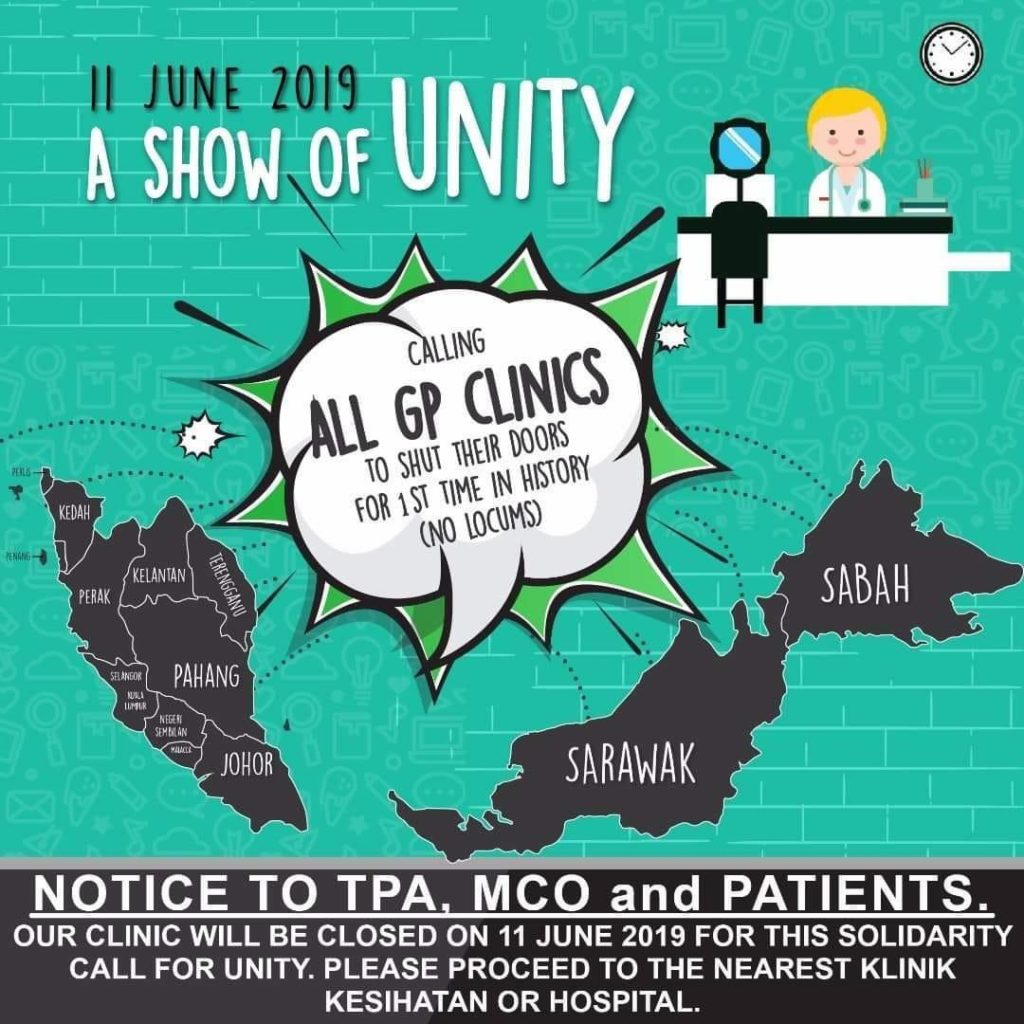KUALA LUMPUR, June 3 — Some general practitioners (GPs) plan to close their clinics during the health minister’s town hall to protest against consultation fees stagnating for 27 years.
A poster has been circulating on social media among medical practitioners’ networks, urging all GP clinics to close on June 11 (Tuesday) in a “show of unity”, the day of Health Minister Dzulkefly Ahmad’s 2pm town hall meeting with private GPs.
A few GPs from Kuala Lumpur, Alor Star, and Ipoh told CodeBlue that they would shutter on that day instead of getting a locum to cover them.
Dr Yek Sing Chee, who runs a clinic in Ipoh, said he already notified his patients weeks ago about shuttering on June 11, as he plans to go to the town hall in Putrajaya with a “bus load” of other GPs from the Perak capital who are similarly closing their clinics.
“We will have to voice out our dissatisfaction at unfair treatment by the Health Ministry, particularly to general practitioners,” Dr Yek told CodeBlue.
The Cabinet recently declined to harmonise private shop lot GPs’ consultation fees of RM10 to RM35 with their hospital-based counterparts’ rate of RM35 to RM125, pending a review by a government council on cost of living. Pakatan Harapan was reportedly concerned about the economy.
Dr Yek complained about the Health Ministry’s plan to regulate drug prices and about how managed care organisations (MCOs) — which are health care providers that offer managed health care plans by contracting with insurers or employers — were “bullying” GPs by capping their consultation fees and making them prescribe the cheapest generics.
“I send my car for service, they charge me RM200, mechanic’s fee is RM100. We’re dealing with human life — RM35.”
He also accused Health Ministry officials of “bullying” GPs by enforcing regulations under the Private Healthcare Facilities and Services Act (PHFSA) 1998 that “control your floor, door, toilet”, even though the previous Barisan Nasional administration had assured them they would not do so.
Dr Yek, who has been running his clinic for 18 years, also said he frequently gave discounts to poor patients, noting that they came to his clinic instead of visiting a government facility due to waiting hours at the latter from morning to evening.
“The government is looking at GPs as if we’re making that much money. We’re not making that much money. We’re putting that much work and effort yes, but we’re not making that much money.”
Government Must Control MCOs
Dr Tan Poh Teng, who has been running a clinic in Alor Star, Kedah, for 25 years, said he was not planning to attend the town hall in Putrajaya, but he would close his clinic on June 11 to protest GPs’ loss of income.
He complained about the low consultation fee and how MCOs have caused his patient load to drop from 70 patients a day in a 14-hour shift to 25 patients.
“Of course business is not doing well,” Dr Tan told CodeBlue.
He said salaries for clinic assistants have tripled since 20 years ago from RM300 to RM1,200 monthly now, besides other overhead costs like indemnity insurance and disposing of clinical waste.
“Going to die soon. I’m not joking. I’m so established and I can feel the pinch, imagine new clinics. The government has to control MCOs, unless we boycott MCOs totally. This is the last resort.”
According to a 2016 report by the Malaysia Productivity Corporation on medical professionals, MCOs are poorly regulated as the PHFSA does not specify MCOs’ responsibilities, with only mere guidelines for MCOs.

Health Ministry’s ‘Master-Slave Mentality’
Dr Pearl Leong, who has been running a clinic in Sri Hartamas here for more than 15 years, said she was also closing her clinic to attend Dzulkefly’s town hall because it was pointless getting a locum.
“I close, I get complaints. I get locum, I get complaints. I might as well save the money,” Dr Leong told CodeBlue.
She questioned why Dzulkefly decided to organise a town hall on a weekday during working hours instead of on a Sunday afternoon.
She complained about the stagnation of shop lot GPs’ consultation fees since 1992, accusing the Health Ministry of breaking its promise to harmonise their fees with hospital GPs’.
“We’re not asking for anything unreasonable, we’re not asking for an increase beyond hospitals. We already gave them credit for seven years,” she said. Hospital GPs’ fees were raised in 2013.
“This is a bullying attitude, this is a master-slave mentality. And this is what I expect from the town hall meeting — it will not be a dialogue, it will be a monologue. Regardless, I’ll go there and ask the difficult questions, make them break a few more promises in public, not in private.”
Dr Leong added that she did not support drug price controls or separation of prescribing and dispensing medicine, saying: “That’s the only thing that’s keeping all GPs like me alive.”
“A lot of patients just give me RM50 and say ‘keep the change, next two times free ah. I pay my hairdresser more than I pay you’. I got sympathetic patients lah, so I get away with it.”
Dr G. Shanmuganathan, who operates a clinic at ParkRoyal Hotel in Kuala Lumpur, said medicine prices have skyrocketed, staff salaries have gone up, and rentals increase every year, but GPs’ consultation fees remain the same.
“It doesn’t make sense anymore to operate,” he told CodeBlue.
When asked if he would close his clinic to attend the health minister’s town hall, he said: “It’s at 2pm in the afternoon. My clinic is 9 to 5, so what do you think?”
It’s Not A Strike
Federation of Private Medical Practitioners Associations Malaysia (FPMPAM) president Dr Steven Chow said he supported the move by GP clinics to shutter on June 11.
“This is not a strike. The town hall was organised by the MOH (Ministry of Health). MOH chose the day, time, and place and date, knowing fully well that GPs have to work. How else can the GP attend this town hall meeting except to close shop and go?” he told CodeBlue.
An anonymous doctor said there would not be enough locums during office hours on a weekday to cover the 1,153 GPs who registered for the town hall with the Amanah leader. Registration closed on May 27.
Two GPs — Dr James Jeremiah from Kota Kinabalu, Sabah, and Dr Lim Boon Show from Seberang Perai, Penang — however said they would not close their clinics on June 11.
“I know there’s a movement. I’m okay with the movement, but I also have to follow my conscience,” Dr James told CodeBlue.
He said his grievance was with MCOs that only pay GPs RM10 or RM15 consultation fees, questioning also the CEO of IHH Healthcare Bhd, a hospital government-linked corporation, who earned RM34 million last year. IHH runs the Pantai and Gleneagles hospitals.
“How did he get paid that kind of money? You’re talking about hospitals overcharging, IHH has a stake in it,” said Dr James. “The government is competing with the private sector; the government should stop.”
Dr Lim urged the Health Ministry not to regulate drug prices, stressing that Malaysia should practice a free market to prevent a monopoly by cronies, like what happened in the rice and sugar industries.
“To be very frank, patients in GP practice don’t want to pay you consultation fees,” Dr Lim told CodeBlue when asked if GP consultation fees should be raised.
“He comes here, expects you to give medicine, and you charge him according to the medicine. I don’t think patients will pay me RM60 just to come to speak to me.”
Malaysian Medical Association president Dr Mohamed Namazie Ibrahim encouraged GPs to attend the minister’s town hall, but advised them to employ locums to cover them.
“We do not encourage confrontation as we are a noble profession and to us, patients come first. And this is what that makes doctors vulnerable. We hope the government realises that and not push them to the wall, for one day they may break.”








